1. Hanging Laundry on Clotheslines
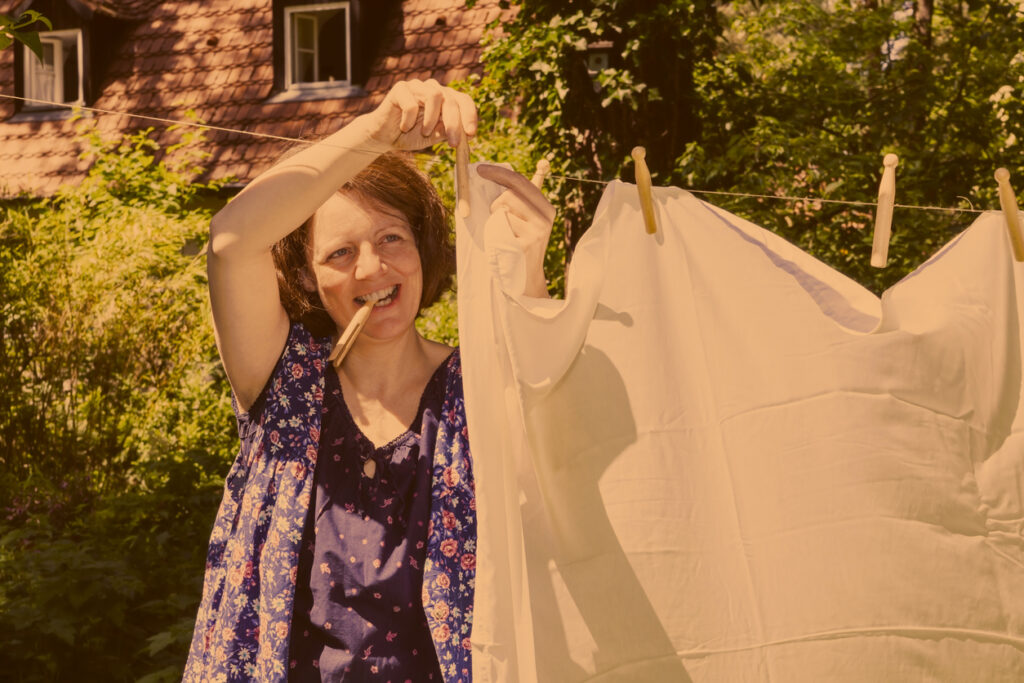
Back when the world moved a little slower and sunshine counted as a helping hand, laundry day was a family affair. In the 1950s and 60s, not every home had a dryer, so clean clothes were carried outside in wicker baskets, heavy and damp. Wooden clothespins snapped onto sheets that fluttered in the warm air while mothers chatted across fences. Rain could undo hours of effort, but when the sun cooperated, the smell of fresh linen floating through the yard made it all worth it. It was work, yes, but there was something peaceful in watching the wind do its quiet chore for you.
2. Polishing Silverware

Every holiday meant a ritual that felt both dreadful and rewarding. The good silver came out of the cabinet dull and dark, demanding attention before guests arrived. Mothers and children sat at the table with cloths and polish, rubbing until their fingers turned gray and tired. The smell was sharp, but the transformation was beautiful. When the last fork sparkled under the dining room light, it felt like proof that love lived in small, gleaming details. It was less about the silver and more about pride, the kind that came from seeing your reflection in the effort you made by hand.
3. Defrosting Freezers

Before modern refrigerators made life easier, defrosting the freezer was the one chore everyone wished to skip. Ice built up like layers of crystal, sealing everything inside until there was no room left. Families unplugged the unit, chipped away at frozen walls with butter knives, and spread towels across the floor to catch the melt. It was slow, messy, and oddly satisfying once it was done. When the hum of the fridge returned and the shelves were spotless, it felt like a small household victory. It wasn’t glamorous, but it taught patience, teamwork, and the value of finishing what you started.
4. Ironing Everything
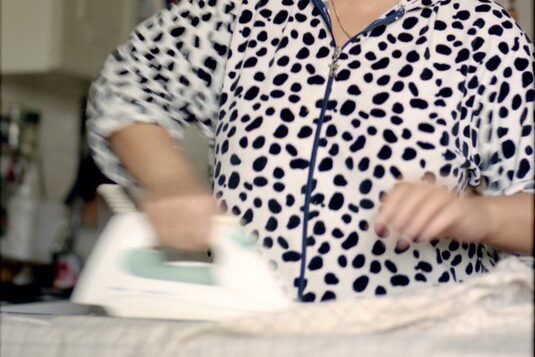
Before wrinkle-free fabric became a thing, ironing wasn’t optional, it was routine. Parents pressed shirts, dresses, sheets, and pillowcases until every crease was gone. The iron hissed softly, filling the air with the scent of hot cotton while kids watched or sprinkled water on stubborn folds. It took hours, but it was quiet work that felt purposeful. Each finished garment represented care and pride in appearance. For many families, ironing day was about more than neat clothes, it was about showing up in the world with intention, one pressed sleeve at a time.
5. Beating Rugs Outside
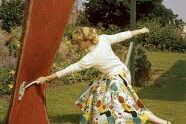
There was a sound that signaled spring cleaning like no other, the steady thump of rugs being beaten in the backyard. Families dragged them out, draped them over clotheslines, and swung rug beaters with determination. Clouds of dust burst into the air, floating across yards as neighbors waved through the haze. It was exhausting work that left everyone sneezing and laughing. But when the rug finally looked brighter and smelled of sunlight, the satisfaction settled deep. It was more than cleaning, it was renewal, the simple joy of shaking winter out of the home and welcoming a season of fresh starts.
6. Emptying Ashtrays

When smoking was still part of everyday life, ashtrays were as common as coffee cups. By evening, they filled with gray ashes and cigarette butts, and someone had to empty them. Kids carried them to the sink, rinsing glass or ceramic trays that reeked of smoke. The smell lingered, but the routine became second nature. It wasn’t pleasant, yet it was just another part of keeping a home tidy. There was pride in resetting the living room, making it neat again before guests arrived. It was one of those small chores that quietly kept order in a smoke-filled world.
7. Winding Clocks

Before batteries and digital timekeepers, winding clocks was a daily reminder that time itself needed care. Families gathered around the ticking mantelpiece, turning tiny keys until the steady rhythm returned. Forget to wind it, and you risked waking late or missing Sunday service. Kids learned the task carefully, counting clicks and listening for that satisfying tick-tock to fill the silence again. The sound became the heartbeat of the house, steady and familiar. It wasn’t just a chore, it was a connection to time, a reminder that even life’s smallest details required attention and a gentle touch to keep moving forward.
8. Cleaning Furnace Filters

When winters grew cold, furnaces worked hard, but only if someone cleaned the filters first. Before disposable ones existed, families dealt with metal screens coated in soot. They pulled them out, banged them against walls, and coughed through clouds of dust until the air flowed freely again. It was dirty and thankless, yet essential. Everyone knew that warmth depended on the effort put in beforehand. The smell of old metal and heat lingered, but so did the satisfaction of a job done right. It wasn’t glamorous, but it was practical, the kind of household task that quietly kept comfort alive.
9. Shining Shoes
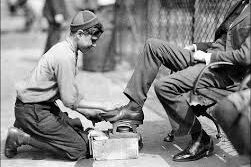
Sunday mornings came with a special kind of sparkle, the shine of freshly polished shoes. Families lined up with brushes, rags, and small tins of wax, rubbing until the leather gleamed. The scent of polish filled the room as kids buffed with pride, checking for reflections in their work. It was part preparation, part ritual, a quiet lesson in presentation. Clean shoes meant respect, both for yourself and for the occasion ahead. When everyone stepped out together, looking neat from head to toe, it wasn’t just about fashion, it was about feeling ready for the world.
10. Cleaning Venetian Blinds

Few chores tested patience like cleaning Venetian blinds. Each narrow slat seemed to trap a new layer of dust the moment you finished the last. Parents handed out rags and old socks for wiping, and sometimes even dunked the blinds into a bathtub for a deep clean. It was tedious and time-consuming, but when sunlight streamed through spotless blinds, it made the whole room brighter. Kids might have grumbled, but there was quiet pride in seeing the difference their effort made. It was proof that sometimes beauty hides behind the smallest, simplest acts of care.
11. Washing Cars by Hand

Before car washes became the quick solution, weekends meant pulling the family car into the driveway with a bucket, sponge, and hose. Parents scrubbed bumpers while kids sprayed each other, pretending it was all part of the job. Soap bubbles glistened in the sun, and laughter often replaced complaints. When the last rinse left the car shining, the sense of accomplishment felt bigger than the task itself. A clean car wasn’t just about looks, it symbolized care, pride, and togetherness. It was one of those chores that somehow became a happy family memory over time.
12. Cleaning Gutters
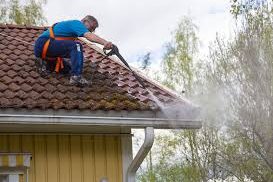
Every fall, the dreaded ladder came out, and someone had to face the gutters. Wet leaves, twigs, and muck piled high until rainwater overflowed. Parents climbed up cautiously while kids steadied the base, praying no one slipped. It was cold, messy, and never fun, but essential for keeping the house safe from leaks. Once the gutters ran clear, satisfaction replaced frustration. The sight of rain finally flowing freely again brought relief. It was one of those chores that no one wanted to do but everyone was grateful had been done.
13. Scrubbing Floors on Hands and Knees
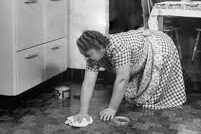
Before convenient mops and sprays, floors were cleaned the hard way. Buckets of warm soapy water sat beside worn knees as kids scrubbed inch by inch with rags. The smell of soap filled the room, mixing with laughter and groans. It was tiring, but when the floor dried spotless, the house seemed to glow. Parents believed the only way to clean properly was to feel the work under your hands. The results proved them right every time. It was a small, humble task that somehow made everything around it feel new again.
14. Burning Trash in Barrels
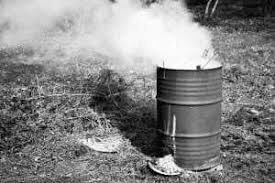
Long before organized trash collection, families handled waste their own way. Rusted barrels sat in backyards, filled with paper, scraps, and old food waiting to burn. Smoke drifted across fences while neighbors waved through the haze. It was smelly, imperfect, and routine. Kids poked at the flames with sticks, mesmerized by the small bonfire of daily life. When the fire finally burned out, a quiet satisfaction remained. It was a time when communities took care of their own mess, and simplicity carried its own strange kind of pride.
15. Darning Socks

Throwing clothes away wasn’t common, repairing them was. When socks developed holes, out came the needle, thread, and a small wooden form or light bulb for stretching the fabric. Mothers stitched carefully, weaving thread over worn spots until the sock was whole again. It wasn’t fast, but it was thoughtful work, the kind that saved money and taught patience. Watching a favorite pair restored felt rewarding in a quiet way. Darning wasn’t just mending, it was a gentle act of care that turned necessity into love, one stitch at a time.
16. Sweeping Porches and Walkways
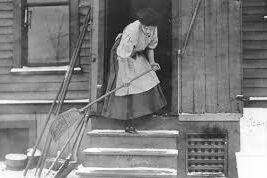
Every morning began with the sound of brooms brushing across porches and concrete paths. Before vacuum sweepers and leaf blowers, keeping the entrance clean was a simple point of pride. Parents believed the first thing guests should see was tidiness, and sweeping the walkway showed care. Kids joined in, grumbling but secretly proud when the path looked fresh again. The scent of morning air mixed with dust and leaves felt oddly comforting. It wasn’t just cleaning; it was preparing the home to welcome the world, one steady sweep at a time.
17. Washing Windows Inside and Out

A bucket of soapy water, a squeegee, and a roll of newspaper were the magic tools of a spotless home. Families spent weekends wiping glass until sunlight streamed through crystal clear panes. Water dripped down elbows, streaks refused to vanish, and someone always missed a corner. But when the last window sparkled, the house felt alive again. The world outside looked brighter, and so did everything within. Clean windows weren’t only about appearance; they were about pride, patience, and seeing the world through effort-polished glass.
18. Washing Curtains by Hand

Curtains once gathered more than sunlight; they held dust, smoke, and the stories of everyday life. A few times each year, mothers carefully removed them, washed them by hand in tubs of soapy water, and hung them outside to dry. The sight of white fabric swaying in the breeze meant the home was being refreshed. Ironing them afterward was tedious, but the reward came when they fluttered crisp and clean against the windows again. The chore carried a quiet rhythm of care, one that made every room feel lighter when finished.
19. Cleaning Radiators

Old radiators were notorious for collecting dust, lint, and forgotten bits of paper. Cleaning them meant using long brushes or even butter knives wrapped in cloth to reach narrow grooves. The hiss of steam and faint metallic smell filled the air as families worked to keep the heat flowing evenly. It wasn’t glamorous, but it mattered. Clean radiators meant warmth in every corner and fewer sneezes during winter. The job was fussy, but the reward was immediate comfort, proving that even the smallest acts of maintenance could make a house feel more like home.
20. Cleaning Lampshades

Lampshades might look harmless, but they trapped dust faster than anything else. Before microfiber cloths or fancy cleaning sprays, people used brushes, old socks, or even breadcrumbs to lift away the grime. It was delicate work, especially for fabric shades that could tear easily. Once the light shone brighter again, the room seemed transformed. The effort reminded families that beauty often hides behind the simplest details. Cleaning lampshades wasn’t thrilling, but it was a gentle way of keeping everyday life just a little brighter.
21. Cleaning Out Closets

Twice a year, closets became treasure chests waiting to be rediscovered. Families emptied shelves, sorted through clothes, and debated what to keep or give away. Forgotten scarves and old shoes resurfaced like ghosts of another time. The process was messy, but by the end, everything felt lighter. Freshly folded linens and neatly arranged boxes brought satisfaction that lingered for days. Cleaning closets wasn’t just organization; it was renewal. It reminded everyone that letting go could make space for something better, even inside a simple wardrobe.
22. Polishing Wood Furniture
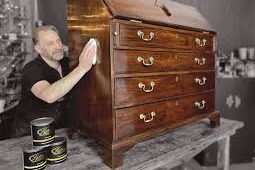
Every piece of furniture once told a story, and keeping it polished meant honoring that history. A soft rag, a tin of wax, and circular motions turned dull wood into a glossy masterpiece. The scent of lemon oil filled the house as hands moved rhythmically across tables and dressers. Children learned to polish carefully, admiring how light danced on newly shined surfaces. It wasn’t fast work, but the glow afterward made every room feel special. Polishing wasn’t just cleaning; it was caring for what made a house feel truly lived in.
23. Cleaning the Oven

Before self-cleaning buttons made life easy, oven cleaning was one of the toughest jobs in the house. Grease and crumbs turned into black crust that required scrubbing, scraping, and plenty of elbow grease. Families armed with baking soda, steel wool, and determination faced the mess head-on. The smell was harsh, and the work was endless, but the results were worth it. A clean oven made baking day feel brand new. It taught patience, persistence, and a sense of accomplishment that modern shortcuts rarely deliver anymore.
24. Waxing Floors

Floor waxing was practically an event. Buckets, mops, and cans of thick polish turned living rooms into makeshift work zones. After spreading wax, families waited for it to set before buffing until their arms ached and the surface gleamed. Kids often slid across the shiny floor in socks, ignoring warnings to stop. The glow afterward made the entire home feel elegant and refreshed. Waxing wasn’t just maintenance; it was pride poured into every motion, proof that hard work could create beauty that shone under every step.
25. Cleaning Stove Burners

Stove burners were small but mighty troublemakers. Grease and food drips clung stubbornly, forcing families to soak, scrub, and sometimes even boil the parts clean. The kitchen filled with the scent of soap and steam as everyone pitched in. It wasn’t glamorous, but it made a difference. Clean burners meant faster cooking and fewer smoky mishaps. The satisfaction of seeing the stove shine again made the chore almost rewarding. It was one of those little tasks that reminded families that care often hides in the smallest details.
26. Washing the Dog

Bathing the family dog wasn’t a weekly task, but when it happened, the whole yard got involved. A garden hose, a bar of soap, and lots of laughter were the main ingredients. The dog usually fought back, shaking water everywhere, but once clean, it pranced proudly with its tail high. The scent of wet fur and sunlight mixed in the air, marking another simple memory of family life. It was a messy job, yet filled with love, patience, and joy that made the effort worth every splash.
27. Cleaning the Basement
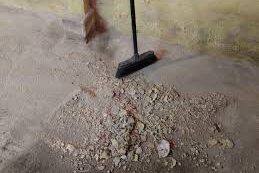
Basements were mysterious, dusty places that needed attention every spring. Families armed with brooms, buckets, and determination tackled cobwebs, boxes, and forgotten furniture. The smell of damp air mixed with old wood and concrete. Kids found lost toys or marbles while parents organized tools and shelves. It was dirty work, but the satisfaction of transforming chaos into order was powerful. When the basement finally felt open and fresh, it brought a quiet sense of pride. Cleaning wasn’t just physical, it was emotional, a way of reclaiming space and starting fresh.
28. Airing Out Bedding

On sunny days, blankets, pillows, and mattresses were dragged outside for a good airing. The sight of bedding fluttering on fences and lines made neighborhoods look alive. The smell of sunshine and fresh air replaced the heaviness of closed rooms. People believed this ritual kept beds healthier and sleep sweeter. It was a simple act, but deeply symbolic of care. Airing out bedding wasn’t just about freshness, it was about letting homes breathe again, and families, too, as they paused to enjoy the calm simplicity of it all.
29. Cleaning Out Kitchen Drawers

Every once in a while, the kitchen drawers became a battlefield of crumbs, rubber bands, and lost spoons. Cleaning them meant dumping everything onto the counter and sorting through the mess. It was strangely satisfying to wipe them clean and reorganize the chaos. Finding an old coupon or a long-lost bottle opener brought unexpected smiles. Once everything slid neatly back into place, it felt like a quiet victory. Kitchen drawers might have been small spaces, but cleaning them made the whole home feel more peaceful and in order.
30. Washing the Family Car’s Interior

Cleaning the inside of the car took patience, especially with sand in the mats and candy stuck between seats. Families brought buckets, brushes, and wet cloths to wipe every corner until the dashboard gleamed. The smell of soap, leather, and air freshener filled the air. Kids helped by picking up wrappers and vacuuming crumbs. It took effort, but the pride afterward made it worthwhile. The ride felt new again, and everyone climbed in smiling. Cleaning the car’s interior wasn’t just tidying up, it was reclaiming small moments of comfort and care.
31. Washing Walls

Before modern paint finishes, walls collected fingerprints, cooking residue, and soot from fireplaces. Spring cleaning meant filling a bucket with soapy water and scrubbing every inch. Kids balanced on chairs or tiptoed to reach high corners while parents wiped the rest. It was exhausting but strangely satisfying. Clean walls made rooms feel new again, like a fresh start after a long winter. The smell of soap lingered for days, a quiet reminder that care didn’t come easy. Washing walls wasn’t glamorous, but it symbolized the pride families took in keeping their homes bright, even if it meant sore arms and dripping sponges by the end of the day.
32. Raking Leaves
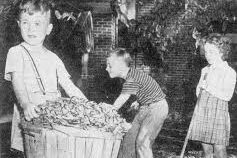
When autumn arrived, yards turned into seas of color. Before leaf blowers, families armed themselves with rakes and patience. Piles grew taller than the kids, who couldn’t resist jumping in before being told to rake again. It was repetitive work, but it connected everyone with the rhythm of the seasons. The smell of crisp air, the crunch beneath shoes, and the sight of neat lawns afterward felt rewarding. Raking leaves wasn’t just yard work; it was tradition. It reminded everyone that nature’s beauty came with effort and that even fleeting moments of fun were worth the mess they left behind.
33. Cleaning Out Garage Oil Stains
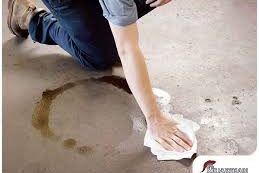
Garages told stories through their stains, especially the dark smudges from leaky cars. Cleaning them was messy business. Families poured detergent, scrubbed hard with wire brushes, and hosed the floor until their arms ached. The concrete never looked perfect, but the effort mattered. The faint scent of soap and motor oil lingered in the air, proof of hard work done well. It wasn’t a glamorous job, but it represented care, resourcefulness, and pride. A clean garage floor wasn’t about perfection; it was about doing the small things that kept life moving smoothly, one scrub and rinse at a time.
34. Sharpening Lawn Mower Blades
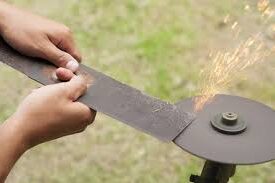
Before new mowers came cheap, families took care of the ones they had. Sharpening blades was part art, part danger. Dads often taught teens how to do it, warning them to stay steady as sparks flew from the file. It wasn’t a task for the impatient. The reward was clear the first time the mower glided across the lawn, slicing evenly again. There was pride in that sound, the hum of sharp metal meeting grass. Sharpening blades wasn’t just about maintenance; it was about skill, patience, and passing down the know-how that kept every summer running smoothly.
35. Carrying Firewood Indoors

Winter nights meant warmth from real wood fires, and someone had to bring the fuel. Kids trudged in from the yard with heavy logs, leaving trails of bark and dirt behind them. The task seemed endless, especially when the wind bit at their fingers. Yet, there was something comforting about stacking the wood, hearing it crackle later, and feeling its heat fill the room. Carrying firewood wasn’t fun, but it taught endurance and care. It was work that made comfort possible, and in that simple trade, families found warmth that came from more than just the fire itself.
36. Cleaning Ceiling Fans

Ceiling fans had a sneaky way of collecting thick layers of dust. Climbing up to clean them meant balancing on chairs with a rag or old pillowcase. The dust never came down quietly—it fell like gray snow over everything. Still, when the fan spun again without sending clouds flying, it felt worth it. The job wasn’t big, but it mattered. Clean fans meant cleaner air and fewer sneezes. Families didn’t think of it as housework, just part of the quiet rhythm of keeping things right, where every detail, even above your head, deserved a little attention.
37. Shaking Out Area Rugs

Besides beating large rugs, smaller ones needed regular shaking. Kids hauled them outside, gripped both ends, and flung them until clouds of dust filled the air. It was a sight and a sneeze-filled struggle, but the freshness afterward made it worthwhile. Sometimes neighbors waved from their porches, laughing as dust swirled like tiny storms. The rugs came back softer, brighter, and free of grit that hid in corners. Shaking out rugs was tedious but simple, a reminder that small acts of care made a big difference in how a home looked and felt when the work was done.
38. Flipping Mattresses

Before modern mattresses promised to stay firm forever, families flipped theirs every few months. It was an awkward, two-person job that often ended in laughter and frustration. Sheets and pillows scattered everywhere as heavy mattresses wobbled in midair. But afterward, the bed felt new again, firm and even. Parents believed it made sleep better, and maybe it did. The fresh scent of aired-out fabric filled the room, signaling a little reset. Flipping mattresses wasn’t exciting, but it was tradition, one that turned routine maintenance into an oddly satisfying moment of renewal.
39. Straightening Magazines and Coffee Tables

Before phones and tablets, living rooms revolved around coffee tables stacked with magazines and ashtrays. Keeping them neat was practically an art. Kids were told to align edges, fluff pillows, and set coasters perfectly. It wasn’t about fussiness—it was presentation. When guests came over, those tidy surfaces reflected pride and warmth. The small act of straightening made spaces feel cared for and inviting. It’s funny how something so simple could carry so much meaning, a quiet ritual that showed attention to detail and love for the place families called home.
40. Cleaning Out the Fridge

Cleaning the fridge was never glamorous but always necessary. Forgotten leftovers, sticky shelves, and mystery containers waited behind every door. Families emptied everything, scrubbed every corner, and tossed what couldn’t be saved. Kids wrinkled their noses, learning what spoiled milk really smelled like. When it was done, the fridge gleamed, smelling faintly of lemon and soap. It wasn’t just about tidiness; it was a fresh start, a little reset that made meal prep feel lighter. Cleaning out the fridge reminded everyone that a clean home wasn’t built in a day—it was maintained one messy shelf at a time.
41. Dusting Record Players and Radios
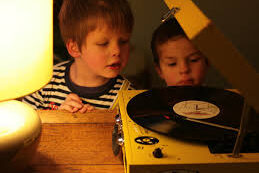
Entertainment once came from bulky record players and radios that attracted dust like magnets. Kids were handed soft cloths and told to clean every knob, dial, and corner. One careless wipe could scratch the surface or ruin the sound. The hum of static afterward meant the job was done right. Music filled the house again, richer somehow after the dust cleared. Dusting these devices wasn’t about cleanliness alone; it was about preserving joy. It kept the soundtrack of daily life alive, one gentle swipe at a time.
42. Straightening the Garage or Tool Bench

Garages and workshops were kingdoms of chaos. Nails, screws, and tools sprawled across every surface. On weekends, parents declared cleanup day, and kids spent hours sorting what they didn’t understand. It smelled of oil, wood, and determination. The rhythm of hammers and broom bristles echoed as order slowly returned. By evening, the bench stood neat, ready for the next project. Straightening the garage wasn’t glamorous, but it carried quiet satisfaction. It meant readiness, resourcefulness, and respect for the tools that built, fixed, and shaped the rhythm of family life.
43. Cleaning Light Fixtures

Ceiling globes and lamps often filled with dust and the occasional unlucky bug. Cleaning them meant unscrewing glass covers and washing them carefully in the sink. Kids hated reassembling them, fearing a crash at any second. Yet, when light poured through freshly cleaned glass, the room felt different—warmer, brighter, alive again. The chore was simple but symbolic, proof that even the smallest tasks could brighten a home. It taught care in handling fragile things, not just in the room, but in everyday life.
44. Dusting the TV Stand and Stereo

The TV stand and stereo were proud centerpieces in many homes. Heavy, wooden, and always dusty, they demanded regular care. Kids wiped them carefully, avoiding tangled wires that could ruin the sound or picture. It was repetitive, sometimes annoying, but necessary. The gleam afterward made the living room feel welcoming again. In those days, every clean surface was a quiet sign of love, effort, and attention. Dusting wasn’t exciting, but it carried meaning, turning an ordinary evening in front of the television into something polished and peaceful.
45. Emptying Trash in Every Room

Before big bins and garbage pickup, every room had its own small wastebasket. Kids were tasked with gathering them all into one bag, always discovering odd scraps of paper or melted candy wrappers. It wasn’t hard, but it was endless. Yet, once the house smelled fresh again, it felt lighter somehow. The chore taught responsibility, consistency, and pride in keeping things tidy. Looking back, these little routines were what held households together. They may have vanished with time, but the quiet discipline they built still lingers. Sometimes, the smallest chores left the biggest mark.
This story Forgotten Household Chores Boomers Remember Doing was first published on Daily FETCH


